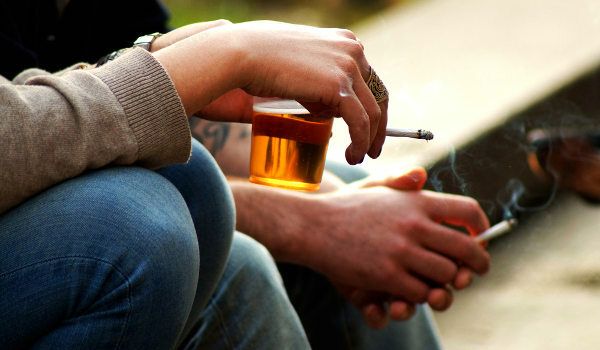drugs they are any substance capable of altering the physiological or psychobiological functions of an organism. Thus, an analgesic or an antacid, often taken to improve discomfort, is also considered a drug. However, the term "drugs” is commonly used to define illicit substances, linked to trafficking and the criminal world. While it is not wrong, defining only these substances as drugs is a naive approach.
It is possible to observe that most of the drugs are legalized and used in medicine to treat the most varied types of illnesses. However, some of them generate controversy because they are addictive. In Brazil, there is a large amount of prohibited drugs, even if they are for medical treatment.

Prescription drugs are also considered drugs.
The regulation or not of certain drugs varies according to the legislation of each country. In some places, for example, marijuana is used in medicine, which is not yet allowed in Brazil.
Types of drugs
Drugs can be classified according to their origin or according to their effects on the body. In the first case, there are three classifications:
natural, synthetic and semi-synthetic. As for the effect, they can be: depressing, stimulating or disturbing. We will see more details about each of them below.natural drugs are those that cause hallucinogenic effects in a natural way, without the composition of chemical products – this means that the production is not done in the laboratory. These types of drugs differ from synthetic drugs, which are produced by chemical means. Examples of natural drugs are marijuana and caffeine.
At synthetic drugs they are those produced from one or several psychoactive chemical substances, which cause hallucinations by stimulating or depressing the central nervous system. They can be used in the form of injection, tablet or powder, and their effects vary depending on the substance. we can quote amphetamines, LSD and ecstasy, for example.
In the case of semi-synthetic drugs, there is a junction of the other two classifications. They are produced based on natural drugs, but undergo chemical changes in the laboratory. This definition fits crack, merla and cocaine.
Effects
Regarding the effects, the most common type of drug is the stimulating, the one that speeds up the activity of the central nervous system (CNS), increasing wakefulness. Despite its use being prohibited or restricted to medical treatments, it is common to find users, sometimes addicts.
In the group of stimulant drugs are crack, cocaine and ecstasy, which are prohibited for use. Amphetamines are also stimulants, but have regulated use for the treatment of some neurological disorders.
Unlike stimulants, depressant drugs they decrease CNS activity and can cause delusions. This is the case with inhalants such as glue and other solvents. In medicine, it is common to use this type of drug to treat insomnia and anxiety, with sleeping pills and anxiolytics, respectively.
The last category of drugs, regarding the effects, are the disturbing. In principle, they cause a feeling of well-being and reduce fatigue. However, they also cause changes in the notion of time and space, in addition to delusions and hallucinations. In this group are drugs such as marijuana, LSD and hashish.

Drug use can cause a feeling of well-being, but it also generates delusions and hallucinations
What are the most used drugs in Brazil?
- Alcohol
- Energetics
- Marihuana
- Caffeine (tablets)
- Tobacco and Hookah
- LSD
- Ecstasy
- Cocaine
- Benzodiazepines (anxiolytics)
Among Brazilians there is a high consumption of alcohol, energy drinks and tobacco, which there is no prohibition on using. The use of marijuana and cocaine, which are prohibited substances, is also common.
Marijuana is the most used illicit drug in Brazil. Second research by the Federal University of São Paulo (Unifesp), held in 2012, 7% of the country's adult population has smoked the herb and about 1% of the Brazilian population is dependent on it.
The same survey shows that 4% of the adult population has tried cocaine, either in powder or base paste (crack, merla or oxy), but the rate of users is 0.2%.
Regarding alcohol, 54% of Brazilians drink at least once a week. The index is higher among men (64%) and lower among women (39%). The survey also reveals that Brazil has 11.7 million people who are dependent on or abuse alcohol.

Alcohol and cigarettes are among the most consumed drugs in Brazil
Legalization controversy
The legalization of drugs, whether for medicinal use or for personal use, is a topic of discussion around the world. The sale is still prohibited in most countries, but in some places it is allowed to carry drugs for personal use.
Countries like Portugal and Germany do not consider it a crime to carry drugs in small quantities. In the United States, drug policy varies by state, but most have legalized the recreational or medical use of marijuana.
In Brazil, the sale or possession of marijuana is not allowed. However, in recent years, discussions on the legalization and/or decriminalization of drugs have increased, influenced by the release in several countries and by the fight against trafficking.
In court, experts diverge as to the flagrant and the way the detainee will be framed: if user or dealer. There is also a large movement of scholars advocating drug legalization. O marijuana extract (cannabidiol) can reduce severe epileptic seizures, for example.
by Rafael Batista
Journalist
